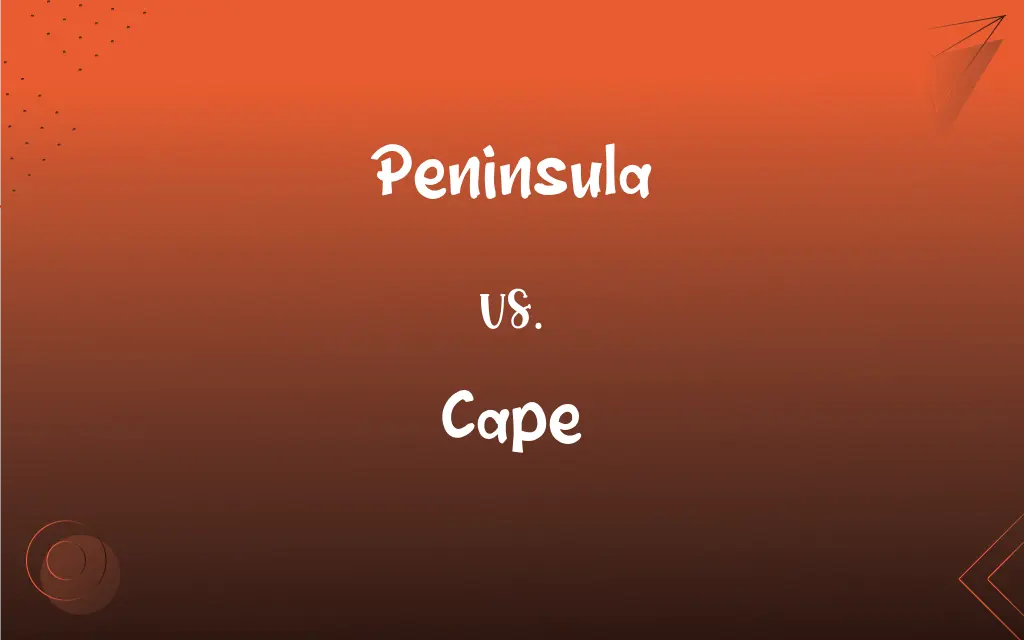Peninsula vs. Cape: What's the Difference?
Edited by Janet White || By Harlon Moss || Updated on November 2, 2023
A peninsula is a landform surrounded by water on most sides, while a cape is a high point of land that extends into a river, sea, or ocean.

Key Differences
A peninsula is a significant landmass projecting into water bodies, typically surrounded by water on three sides, forming a prominent extension from the mainland. Capes, on the other hand, are pointed, often smaller projections into the water that mark a notable change in the coastline. Both are landforms interacting with water, yet their size and formation processes can differ greatly.
Peninsulas serve as striking features on the map, surrounded largely by water yet connected to a larger landmass, providing access between marine and terrestrial environments. Capes are more about the specific points, jutting out into the water and often marking the boundary between two coastal regions. While peninsulas can contain multiple ecosystems, capes are often more uniform.
When discussing geographic significance, peninsulas often have diverse uses, including settlements, agriculture, and transport routes due to their extensive land area. Capes may not support extensive human activity due to their size but are critical for maritime navigation as landmarks. Each has its distinct geographic importance but varies in human utility.
Peninsulas are formed by tectonic activities, sediment deposition, or rising sea levels that may isolate a landform except for an isthmus. In contrast, capes are usually formed by differential erosion where harder rock remains as the sea erodes softer rock around it. Their creation stories are as different as their physical forms.
Geographically, peninsulas can be found on every continent, creating significant cultural and economic regions, like the Florida Peninsula. Capes, found worldwide, often bear historic or navigational importance, such as Cape Horn, known for challenging maritime passage. Their global presence underscores their distinct identities in geography.
ADVERTISEMENT
Comparison Chart
Definition
Land surrounded by water on most sides but connected to a larger landmass.
Land point extending into water, not as large as a peninsula.
Size
Typically larger, sometimes hosting entire countries.
Smaller, can be just a few square miles or less.
Formation
Often formed by tectonic forces or rising sea levels.
Usually formed by differential erosion.
Human Settlement
Often home to large populations and infrastructure.
Less suitable for extensive settlement.
Geographical Importance
Can significantly affect climate and geography of an area.
Important for navigation and as landmarks.
ADVERTISEMENT
Peninsula and Cape Definitions
Peninsula
A landmass surrounded by water on three sides but connected to a mainland.
The peninsula was a popular destination for beachgoers.
Cape
A pointed piece of land jutting into a sea or lake.
The lighthouse stood guard at the cape.
Peninsula
A strategically significant landform for maritime and terrestrial ecosystems.
The peninsula's unique climate supported a diverse range of species.
Cape
A high point of land extending into a water body beyond the coast.
Sailors used the cape as a navigational reference.
Peninsula
A piece of land that is almost an island but remains connected to the mainland by a narrow strip.
Wildlife was abundant across the narrow peninsula.
Cape
A landform marked by a distinctive change in the coastline direction.
The cape marked the southernmost point of their journey.
Peninsula
A geographical feature contributing to the shape of the coastline.
The map's detail showed the peninsula’s rugged terrain.
Cape
An elevated land extension into the sea often less inhabitable or developed.
Birds flocked to the remote cape each year.
Peninsula
An extension of the land projecting into a body of water.
Boats docked along the shore of the peninsula.
Cape
A coastal landform noted for being a prominent point.
The cape was visible for miles, even through the mist.
Peninsula
A piece of land that juts out from a larger land mass and is mostly surrounded by water.
Cape
A sleeveless outer garment fastened at the throat and worn hanging over the shoulders.
Peninsula
(geography) A piece of land projecting into water from a larger land mass.
Cape
A brightly colored cloth used in maneuvering the bull in a bullfight; a capote or muleta.
Peninsula
A portion of land nearly surrounded by water, and connected with a larger body by a neck, or isthmus.
Peninsula
A large mass of land projecting into a body of water
FAQs
What defines a peninsula?
A peninsula is defined by land surrounded by water on three sides.
How does a peninsula affect climate?
Peninsulas can affect local climate, often moderating temperatures due to surrounding water.
Do people commonly live on peninsulas?
Yes, many peninsulas worldwide have significant populations and cities.
Are capes important for navigation?
Yes, capes serve as critical navigational landmarks for maritime travel.
Are peninsulas typically large landforms?
Yes, peninsulas can range from small landforms to vast areas extending into water bodies.
Can a cape become a peninsula?
Not typically; their formation processes and resulting sizes differ too much.
Is every coastal point a cape?
No, not all coastal points are significant enough to be termed capes.
How are peninsulas formed?
Peninsulas can form through tectonic forces, sediment deposition, or sea-level changes.
What role do peninsulas play in culture?
Peninsulas often have historical significance and can influence local cultures.
What is the most famous cape in the world?
Cape Horn or the Cape of Good Hope are among the most famous capes.
What's the difference between a cape and a point?
A cape is larger and usually more prominent than a point, which is more diminutive.
What is the largest peninsula in the world?
The Arabian Peninsula is the largest in the world.
What is a cape in geography?
A cape is a high point of land that extends into a river, sea, or ocean.
Are capes always rocky and elevated?
Many capes are rocky and elevated, but not all; some can be sandy and low-lying.
How do peninsulas benefit economies?
Peninsulas can benefit economies through ports, tourism, and providing fertile land.
Do capes have any economic significance?
Capes can be significant for fishing, tourism, and as sites for lighthouses.
Can a peninsula ever be fully surrounded by water?
No, if it were fully surrounded, it would be an island, not a peninsula.
Can a cape be large like a peninsula?
Generally, capes are smaller and narrower than peninsulas.
Do capes have unique ecosystems?
Some capes can have unique ecosystems, especially if they feature distinctive flora and fauna.
Is a cape always found at the edge of the sea?
Mostly, yes, but capes can also extend into lakes or large rivers.
About Author
Written by
Harlon MossHarlon is a seasoned quality moderator and accomplished content writer for Difference Wiki. An alumnus of the prestigious University of California, he earned his degree in Computer Science. Leveraging his academic background, Harlon brings a meticulous and informed perspective to his work, ensuring content accuracy and excellence.
Edited by
Janet WhiteJanet White has been an esteemed writer and blogger for Difference Wiki. Holding a Master's degree in Science and Medical Journalism from the prestigious Boston University, she has consistently demonstrated her expertise and passion for her field. When she's not immersed in her work, Janet relishes her time exercising, delving into a good book, and cherishing moments with friends and family.
































































